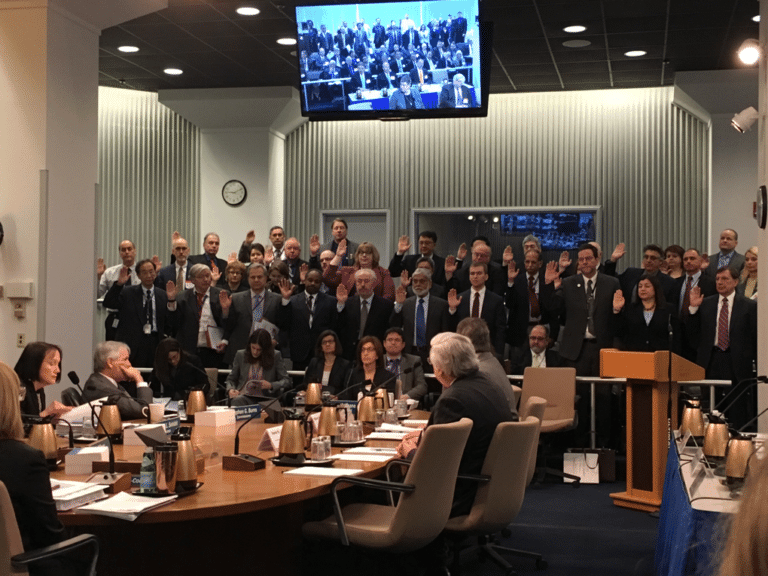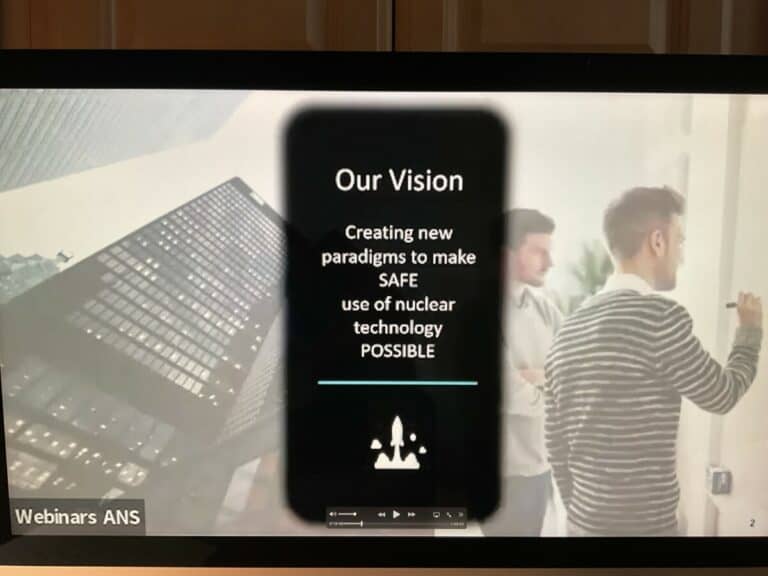Nuclear professionals move forward with due haste – rushing is not in our DNA
On August 2, 2011, the Senate Environment and Public Works Committee held a hearing with all five members of the Nuclear Regulatory Commission. The subject was the 90-day report by six career regulators with recommendations for actions to take as a result of their interpretation of the sketchy information that has been discovered so far in the wake of the earthquake and tsunami that destroyed three aging reactor units at the Fukushima Daiichi nuclear station.
I have watched all of the initial speeches by the Senators and am running out of time to post before going to my day job. I promise to come back and produce more details by early tomorrow morning. However, it is important to share what I have learned so far so that others might pick up the ball and run.
There is little doubt that the forces who dislike nuclear energy in all forms have decided that pressing forward to completely overhaul the existing regulatory framework is a great idea that must be implemented within the next 90 days. This is in violation of the way that any good nuke approaches a problem where he sees the potential for improvement, but also recognizes that the existing situation is not broken. As my chiefs used to repeat on submarines – “If it ain’t broke, don’t fix it.” They knew that breaking down machinery for repairs poses its own risks that the machinery may never work again. That same philosophy holds true for a political or regulatory system – it may not be perfect, it may have a few leaks and creaks, but complete overhauls are risky business.
Of course, if your goal is to break something that is working reasonably well and you do not want to reveal that goal too clearly, it is to your benefit to advocate an overhaul. Just think about the conflict of interest between a car repairman who works for a new car dealership where business is a little slow.
Several senators, including the reliably antinuclear Bernie Sanders, are pushing hard for an immediate overhaul so that the NRC gets completely distracted from all other business, like licensing new reactors or extending the licenses of existing reactors. For Sanders, the motive for distraction extends to his continuing effort to force Vermont Yankee to shut down next year so that his state can import more electricity from Canada and burn more natural gas.
The Chairman of the NRC has already staked out his position; in fact, he preemptively staked it out in a speech to at the National Press Club even before the 6-member review committee had briefed the rest of the Commission on the results of their 90-day quick look. He wants the opportunity to completely destroy the foundations that made the NRC the “gold standard” of international regulatory bodies, and also made the NRC the best place to work in the federal government for several years in a row – before he was appointed as the Chairman and established a hostile work environment.
Though I have not yet gotten to the point in the video where the commissioners have the opportunity to speak, I have read that at least three of the remaining four have expressed a more typically nuclear approach – they want to move forward with care and consideration, being cautious not to break that which is working reasonably well.
Perhaps their caution is because they happen to know more about the technology that they are regulating that Sanders or Jaczko do. (William Ostendorff, for example, retired from the US Navy as a Captain (O-6) after serving on board six nuclear powered submarines including commanding the USS Norfolk, and serving as the Commander of Submarine Squadron Six, where he was ultimately responsible for the operations and maintenance of eight submarines and a floating drydock. As nukes would say, the man is “heavy.”)
This morning, when I checked my investment portfolio, I realized that the uncertainty revealed in that hearing had lowered its value by almost 10% in a single day. The investment community is worried, but I see it as a buying opportunity for companies with excellent prospects for growth in the coming nuclear age.
I freely admit it. I am “all in” when it comes to investing in the fact that nuclear energy is going to play a key role in both the United States and around the world. I remain convinced that the forces of evil that are arrayed against the use of nuclear fission energy will be defeated by key facts:
- Uranium has 2 million times as much energy per unit mass as oil
- Atomic fission does not release any CO2
- Atomic fission does not produce any air pollution at all
- Atomic fission waste products are tiny and fully contained
- The fuel for atomic fission included not only the U-235 that we use today, but also U-238 and Th-232.
- To be more accurate, the latter two need an intermediate step Pu-239 and U-233 respectively. However, I like to think of them as “damp logs” that will burn just fine if you set up the right kind of fire.
- Plenty of smart people know the truth and can overcome the effort of the aging hippies, disgruntled ex-nukes, particle physicists, college dropouts, and oil&gas money that has been successful – so far – in spreading the untrue FUD about nuclear energy.
Now it is time to get ready to go to work and do what I can to help design a nuclear power system that can expand the market for nuclear to places where the extra large plants simply do not fit.




Also when a natural incident occurs, a nuclear plant is able to give you something that the other technologies can’t: time to react and evacuate calmy if and when you need to!
I agree, haste makes waste. The naturally caused nuclear accident happened in Japan, not the United States. Yes, the Fukushima accident needs to be studied, understood, and learned from but the phrase “complete overhaul” is going way overboard especially since the accident didn’t happen here.
And especially since tsunamis aren’t credible for all but the 2 California plants.
Also, I know that at least 1 (perhaps all?) U.S. nuclear utility’s plants have more robust emergency diesel generators and fuel tanks than what was apparently present at Fukushima Daiichi.
How would a Nuclear Education and Media Response organization handle this infomation?
James Greenidge
Evacuation plans and drills should stress that antidotes to Iodine and Cesium exists and that people have no need to rush or worry. If you live next to any other thermal plants, time is a luxury you do not have!
Senator Boxer in her prepared statement concluded that the NRC must implement reforms within 90 days while citing 15 anti-nuclear NGO’s as the basis of her opinion on “reforming” the NRC.
She also believes, per her statements, that we engineers operate as do politicains by moving from headline to headline by her quoting Senator Mark Kirk from Illinois who seems to think engineers make decisions based on the latest Washington Post headline. Prime example of the disconnect between beltway politics and the rest of the nation.
Engineers do not use the headlines to make decisions. Most engineers are strong, opinionated individuals from all spectrums of the political scale who analyze the data in front of them not the conclusions of some liberal arts educated opinion writer.
Once again the anti-nuclear chairman Jaczko is living up to his handlers expectations of him. If he gets his way the UCS and Greenpeace will have an inside track to tear apart the NRC. Changes do need to happen to the NRC but not this way.
I realized I need to amend my original comment in that there are certain individuals such as Rod, our host here, and others who have liberal arts backgrounds but also have taken an interest and the time to develop a deep understanding of nuclear technology.
My point was that the NRC commissioners should NOT be using the latest NYT or Washington Post headline, opinion piece or voter opinion polls to make technical decisions as Senator Boxer believes. And the commissioners definitely should NOT be relying on anti-nuclear NGO’s such as UCS and Greenpeace to make policy decisions that will affect billions in nuclear power infrastructure investments.
It is one thing for politicians and political appointees such as Chairman Jaczko to use those types of public, non-technical news articles and groups as a basis for proclaiming sweeping changes must be made. But is it entirely different to force engineers and scientists through that keyhole into making technical decisions based on opinion pieces from prominent newspapers that are more focused on the latest soap opera political scandal then actual problem solving.
“the reliably antinuclear Barry Sanders”
The first part is absolutely correct, but I think you mean Bernie Sanders (Socialist-VT).
“And especially since tsunamis aren’t credible for all but the 2 California plants”
Although both San Onofre and Diablo Canyon are located on the Pacific Coast, neither is near an underwater subduction zone of the type that produces large tsunamis. And Diablo is perched on a 100-foot bluff anyway.
There really is only one issue here, that concerns all, and the ability of NRC and operators to attend: a natural disaster (quake, fire, flood or tornado) that could destroy enough of the grid to make a nuke plant’s auxiliary power run out of gas after 3 days. They DO need to address this.
Secondly, much less important, is a seawall for the SONG plant north of San Diego. The sucker is built right ON the beach…literally. You can surf right up to the plant ‘sea wall’ on a really good wave.
There has never been a recorded (historically or geologically) tsunami there. But the public would get a great assurance if they built a nice 10 meter sea wall (rock jetty) out about 1/4 mile to protect the plant “just in case”.
Diablo Canyon doesn’t need one at all, IMO and is situation perfectly to avoid tsunamis.
David
@ David
Is spending millions on engineering designs and environmental impact statements then tens of millions on construction a reasonable price to pay to reassure the public? When the utility has to ask to increase rates to build the sea wall, they will need more justification than to make people feel safe. If there is no evidence in the geologic history then they may not be willing to pay for the upgrade.
There is a difference between a complete overhaul initiated from within and a review process initiated by peers, the law and government. We all have wanted change but letting a power hungry leader who has proven to be anti-nuclear dictate what kind of changes is exactly the opposite of what most of us had in mind about regulatory reform.
I seem to see this over and over again. Liberal Democrats like Bernie Sanders are anti nuke. Conservatives are generally pro nuke. This is one of the reasons I am a proud conservative.
Many who self-identify as “left” or “liberal” are nuke supporters, so I’d hesitate to make such a sweeping statement.
I really think we should as a society try to ditch this grossly simplistic political model of “left”, “right”, “conservative”, “liberal”. These labels are so over-used, misrepresented and abused as to now be almost meaningless.
These are cheap labels typically used by propagandists to promote the “us vs. them” narrative, one that helps the target audience forget to THINK. Policy, facts, results, logical analysis – these are the things that matter. They are also the things in a real public debate that many pols would rather we not indulge in too much. The left-right divide that populates cable chatter is so much nonsense, a distraction within an elaborate game of political theater meant more to confuse and confound the masses rather than enlighten and educate, IMHO.
We need to focus on science fact and reason, right vs. wrong, not right vs. left.
@ Bill and Steve
There are 2 things that everyone agrees upon:
1) Bipartisan interest in energy independence today motivates strong support for alternatives to fossil fuels.
2) Energy experts, for their part, have long been overwhelmingly pro-nuclear, viewing nuclear as safer and cleaner than fossil energy, and cheaper and more reliable than renewables.
I think the proper message has to focus on the technology and not on left or right paradigms.
Nuclear is the energy of human knowledge. We should be proud of that.
As I watched most of the video, Senator Boxer seemed rather belligerent toward the commissioners. She wanted yes or no answers when answering yes or no is an answer to a leading question. Answering a y/n question to someone who is rather hostile and thinks they know what the correct answer should be ahead of time is not educational. Her tone seemed to say, “tell me what I want to hear, otherwise you’ll have hell to pay.”
Whether or not the recommendations are implemented is not going to be the deciding factor if the American people trust nuclear energy. Education about nuclear power is the deciding factor. Boxer is filled with FUD, she has no special appreciation for just how special nuclear power is.
Bill Rodgers said, “Once again the anti-nuclear chairman Jaczko is living up to his handlers expectations of him.” I warned you of this two years ago when Obama got elected. I warned you that he would put Jackzo in charge. Liberal. Progressive. Democrat. Same as Barbara Boxer. Remember this in 2012.
opps, three years ago – my how time flies!
Keep up the good work Rod, but… I’m an aging hippie and I’ve always been pro-nuclear power. I do not understand the Democrats position to nukes. They almost have me wanting to vote Republican. Thank God the Tea Party took care of that crazy idea.
@Jeff – no offense intended. I was referring to a few particular aging hippies, along with a few particular particle physicists, a few particular college dropouts, and a few particular donors from the oil&gas industry.
The “bench strength” of the antinuclear movement is actually quite limited. I could probably do a pretty decent job of naming the dozen or so media darlings who lead the movement. When you see photos of the protests – unless there is an all star line up of musicians to attract a crowd – you will see that the cameras have to be carefully positioned in order to make it seem like there are a lot of people in the field of view.
I suspect that the vast majority of Americans want exactly what nuclear fission power plants deliver every single day. They want affordable, clean, reliable electricity. They do not want the source to impede on their lives – they, quite legitimately – believe that electricity is something that just keeps coming out of the socket as long as they live in a reasonably well developed location in the US and as long as they pay a modest monthly bill.
They do not want power that fluctuates with the wind and the clouds and they certainly do not want their bills to fluctuate with the changes in natural gas prices. They would also prefer if they did not have to feel guilty about blowing up half of the mountains in the state of West Virginia and they probably have some desire to keep from permanently altering ocean and atmospheric chemistry enough to change both natural and developed habitats on land or in coral reefs.
BTW – I would be an aging hippie myself, but I was born about a decade too late. Instead, I was just a long haired disco fan – until getting shorn as part of the deal I made to get a free education at a respected school.
“…getting shorn…”
That was a pivital moment wasn’t it. Shocking wasn’t it! We have that in common.
No one has to ask why the evacuations took place, but good news here from NHK WORLD NEWS :
Evacuation orders to be lifted in late August
The government says it wants to lift evacuation advisories in a few weeks for areas 20 to 30 kilometers from the Fukushima Daiichi nuclear power plant.
A recovery timetable released on Wednesday proposes lifting the evacuation notice later this month or early next since the situation at the plant has improved.
The plan covers areas between 20 and 30 kilometers from the plant. Residents there are currently advised to stay indoors and prepare for emergency evacuation.
Many residents there have been forced to evacuate, and schools and hospitals are closed.
The government says it will begin negotiations with local municipalities later this week and ask them to draw up reconstruction plans.
The measures are expected to include reopening hospitals and other public services and decontaminating schoolyards.
The government says it will support each local government to help them bring residents back home.
If it’s not too off-topic – this just in:
http://www.nytimes.com/2011/08/04/nyregion/indian-point-plant-may-turn-to-giuliani-as-defender.html?_r=1
Entergy to hire Rudy to head up PR defense of Indian Point. It’s about time.
Too bad Rudy didn’t run for Governor last year; IPEC might not have this problem.
In Googling around for it, but I hope to find Rudy’s e-mail address and forward him major extraps from this blog as air support. The Times is already positioning it as a “profits vs public safety” issue.
James Greenidge